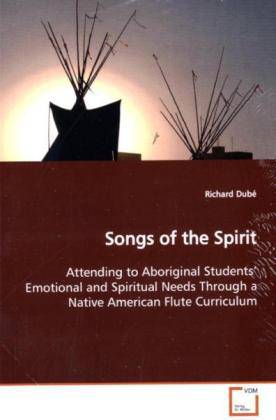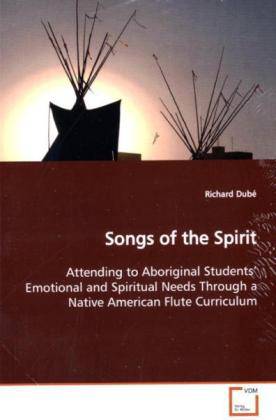
- Afhalen na 1 uur in een winkel met voorraad
- Gratis thuislevering in België vanaf € 30
- Ruim aanbod met 7 miljoen producten
- Afhalen na 1 uur in een winkel met voorraad
- Gratis thuislevering in België vanaf € 30
- Ruim aanbod met 7 miljoen producten
Zoeken
Songs of the Spirit
Attending to Aboriginal Students Emotional and Spiritual Needs Through a Native American Flute Curriculum
Richard Dubé
Paperback | Engels
€ 75,45
+ 150 punten
Omschrijving
This narrative inquiry explores how the Songs of
the Spirit Native American Flute curriculum
impacted spiritual and emotional aspects of the
learning and lives of Aboriginal students, their
families, their parents, and their school community.
My research took place at an urban Aboriginal high
school in Saskatchewan from January to March, 2006.
When participants heard the music, it [sounded] so
eloquent and so spiritual. It [was] almost like the
flute [was] weeping, (Onawa Gaho, Recorded
conversation, March 17, 2006, p. 5) bringing
about a calmness to the anger that some [Aboriginal
students] have (Sakima Qaletaqa, Recorded
conversation, March 15, 2006, pp. 25-26).
The research findings indicate the Songs of the
Spirit curriculum, in honoring the holistic nature
of traditional First Nations teachings, invites
Aboriginal students functioning in vigilance mode
to attend to their emotional and spiritual needs.
They speak to a need for rethinking curricula in
culturally-responsive ways, for attending to the
importance of the arts in education, and for
reforming teacher education.
the Spirit Native American Flute curriculum
impacted spiritual and emotional aspects of the
learning and lives of Aboriginal students, their
families, their parents, and their school community.
My research took place at an urban Aboriginal high
school in Saskatchewan from January to March, 2006.
When participants heard the music, it [sounded] so
eloquent and so spiritual. It [was] almost like the
flute [was] weeping, (Onawa Gaho, Recorded
conversation, March 17, 2006, p. 5) bringing
about a calmness to the anger that some [Aboriginal
students] have (Sakima Qaletaqa, Recorded
conversation, March 15, 2006, pp. 25-26).
The research findings indicate the Songs of the
Spirit curriculum, in honoring the holistic nature
of traditional First Nations teachings, invites
Aboriginal students functioning in vigilance mode
to attend to their emotional and spiritual needs.
They speak to a need for rethinking curricula in
culturally-responsive ways, for attending to the
importance of the arts in education, and for
reforming teacher education.
Specificaties
Betrokkenen
- Auteur(s):
- Uitgeverij:
Inhoud
- Aantal bladzijden:
- 132
- Taal:
- Engels
Eigenschappen
- Productcode (EAN):
- 9783639099874
- Verschijningsdatum:
- 19/12/2008
- Uitvoering:
- Paperback
- Afmetingen:
- 150 mm x 220 mm
- Gewicht:
- 215 g

Alleen bij Standaard Boekhandel
+ 150 punten op je klantenkaart van Standaard Boekhandel
Beoordelingen
We publiceren alleen reviews die voldoen aan de voorwaarden voor reviews. Bekijk onze voorwaarden voor reviews.








